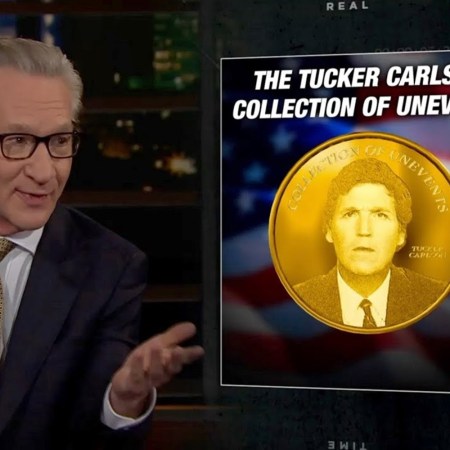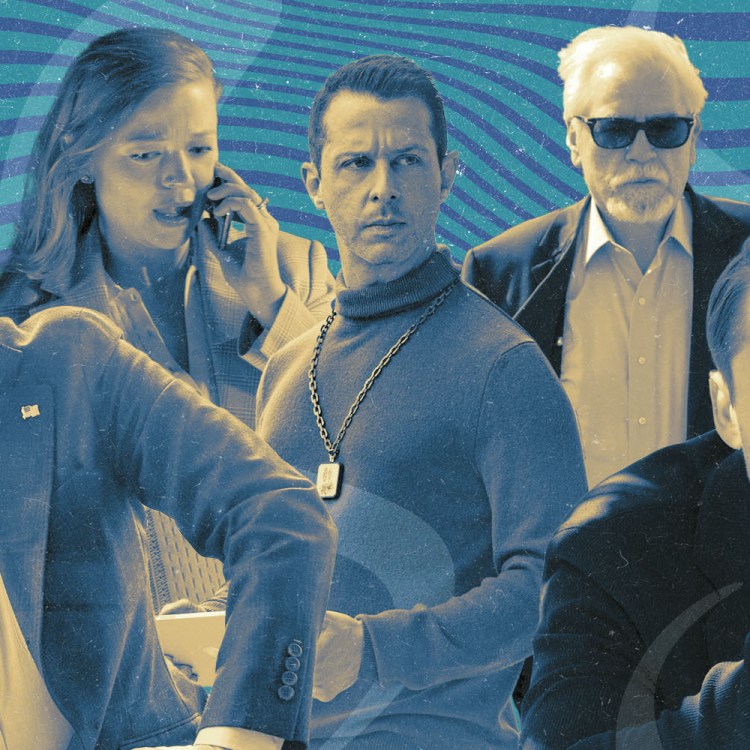The default image for this season of Real Time With Bill Maher finds Maher standing in front of a single line of text, stating You Can’t Cancel the Truth. The most recent episodes of this season have had a slightly different theme, however — questions of national division and reconciliation. And it was with one such example that Maher began the March 18 edition of the show.
“The Senate voted unanimously — when have you ever heard that? — to keep Daylight Savings Time permanent,” he said. “It’s something.”
The Russian invasion of Ukraine was an ongoing theme in the episode, beginning with Maher’s opening remarks on Volodymyr Zelenskyy’s work as a comedian. The entertainer-to-politician pathway came up in a few iterations over the course of the monologue, including Maher applauding Arnold Schwarzenegger’s appeal to Russians to stop the war — and a dig at Stephen Seagal.
Maher went on to cite the absurdity of the Russian McDonald’s knockoff, and the spectacle of Putin going “full Trump.” But if you were looking for a more cringe-inducing moment, the monologue (unfortunately) had that as well. Maher closed out the segment with a riff on Lia Thomas’s national championship win and, more broadly, the topic of trans athletes competing in sports.
The episode’s first guest was Ernest Moniz, the former U.S. Secretary of Energy. “You know all things nuclear,” Maher said, and asked Moniz to address the increasing anxiety over nuclear war. Moniz cited his work with the Nuclear Threat Initiative, and expounded on the concept of “escalate to de-escalate” — the idea that Russia might use a five-kiloton nuclear weapon to show that they’re serious. The concern, Moniz observed, is that this wouldn’t de-escalate but would just escalate it further.
And from there, the two men discussed nuclear security, with Maher bringing up the action film Broken Arrow and making the point that it’s worrying that the military has a term for a lost nuclear weapon.
Later in the interview, Moniz discussed green energy and his work with the Energy Futures Initiative. He spoke about the Green Real Deal, which — he told Maher — differs from Green New Deal in some ways, including the use of nuclear power and some fossil fuels. He advocated for nuclear power, calling it “a strong baseload of carbon-free power.” And he suggested that technology was “closer than you think” on fusion, with a prediction that it could happen within the decade.
For the evening’s panel, Maher was joined by two frequent guests. Max Brooks is the author of (most recently) the novel Devolution, and the YouTube series Max Brooks Breaks Down. Kristen Soltis Anderson is the author of the newsletter Codebook and the book The Selfie Vote: Where Millennials Are Leading America (And How Republicans Can Keep Up). To kick things off, Maher returned to a subject from last week’s show: why hadn’t Vladimir Putin invaded Ukraine when Donald Trump was in office? Brooks had an answer, saying “He didn’t invade because he didn’t need to.” Anderson noted that Putin’s actions had gotten the opposite effect from what he desired — i.e. strengthening unity and defense of Europe. The ensuing discussion of oligarchs found Anderson discussing her fondness for Formula One, which baffled Maher.
Anderson’s experience in polling led Maher to ask her a few questions on the state of American politics. Maher noted that the American public supported what Biden has done so far, yet his approval remains low. Anderson’s take on it was that partisanship had something to do with it — roughly a third of Republican voters liked the policies, but not Biden himself.
A different form of domestic politics came up later in the segment. “Is it a good thing that corporations always have to take sides on every political issue?” Maher asked. Anderson noted that the politics of this had shifted over the last 10 years, but suggested that Disney was in a more complex position than most due to their family-friendly brand.
“Doesn’t anybody who makes money take a stand, whether they want to or not?” Brooks commented.
From there, the panel explored the effect of this on partisanship. Maher lamented the lack of a monoculture, saying, “America needs more neutral things.”
Maher brought up Kyrie Irving in the second half of the panel, focusing on the overlapping regulations that govern Irving’s behavior — where he can watch a Nets game at home without a mask, but not play. Brooks was skeptical of the “let him play home games” argument. “[Irving] could hurt somebody,” he said. Maher pushed back against this, and mentioned that he was more concerned about cancer than COVID. Maher then argued that elite athletes should be able to opt out of the vaccine. “Cancer is not contagious,” Brooks responded.
Anderson came at the issue from a broader perspective, addressing the messaging around the pandemic, which led to a broader discussion of risk perception. Maher spoke about being frustrated when he sees people wearing masks outside. All of this led to recurring discussions of disagreements, culminating in Brooks getting the evening’s best line. ”I’m married with a kid, I don’t smoke weed and I read comic books. My life is your worst nightmare,” Brooks said. “But we’re here.”
Brooks’s commentary throughout both the episode and Overtime was one of the evening’s highlights. Especially notable were his unexpected allusions to history, including invoking Haile Selassie’s 1936 attempts to convince the League of Nations to intervene against Italian fascism.
The opening moments of New Rules found Maher addressing dildos, tumeric and — uh-oh — television recappers. The bulk of the segment, though, focused on changing or not changing the name of something after its essential nature changes. “You can buy a petting zoo and turn it into a bondage dungeon, but you’ve got to change the sign,” Maher said.
Initially, it seemed like he was discussing Playboy and the Sports Illustrated Swimsuit Issue’s changes in recent years. “You have every other magazine! Why do you hate Dad so much?” he said. “You haven’t reformed the soft-core gentleman masturbator. You’ve driven him to creepy porn dot com.”
From there, he grouped other things under the same umbrella, from the growing celebration of single people on Valentine’s Day to a recent shift in policy at the ACLU. (He’d made a similar point on the latter a few weeks ago.) But this didn’t ultimately lead to another conclusion expressing frustration with millennials; instead, the Republican Party was the target of his ire.
Maher pointed out that the GOP was once ardently patriotic, while now, Tucker Carlson’s broadcasts have ended up on Russian state television. Maher was similarly withering with respect to many Republican elected officials’ comments in the aftermath of the events of January 6. Would it be better, Maher asked, to rename it “The Trump Party”? The question lingered as the credits rolled.
Thanks for reading InsideHook. Sign up for our daily newsletter and be in the know.


















